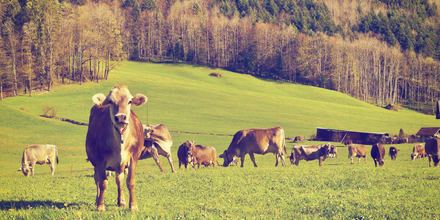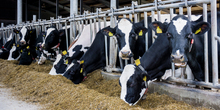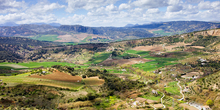Climate Change & Energy
Our Work
Latest in Climate Change & Energy
-

The consequences of climate change for EU Agriculture: Follow up to the COP21 UN Climate Change conference
With its potential to reduce GHG emissions and increase CO2 removals, agriculture has a key role to play in the EU’s climate mitigation efforts, yet Member State action is lacking. As pressure on the sector to act increases, the development of a 2050 low-carbon and resilience roadmap for European agriculture would be one step towards putting the sector on a more ambitious trajectory towards the transformation required to achieve net zero emissions by 2050.
-
Agriculture and its role in meeting the EU’s climate commitments
Sector far from reaching its climate mitigation potential, with Member States placing more emphasis on climate adaptation
-
What contributions can agricultural emissions make to the proposed Effort Sharing Regulation?
New IEEP report finds the agriculture sector can significantly contribute to the EU’s climate commitments by reducing its non-CO2 emissions. It also finds these contributions can be delivered cost efficiently with environmental co-benefits without impacting production.
-
Towards sustainability: Future policies for European livestock
The CAP is failing to reward adequately those livestock farmers who produce public goods. Brexit and CAP reform are opportunities to do better.
-
Greening taxes and subsidies in the Pacific
IEEP will share its expertise on environmental taxation and the reform of environmentally harmful subsidies at a forum event on greening taxation and subsidies in the Pacific region during the IUCN World Conservation Congress in Hawaii.
-
Land suitability assessments for bioenergy feedstocks in the EU – a review of data sources
Current data availability is inadequate to undertake a detailed national or European level study of land areas that are underutilised and could be considered available for bioenergy production within the EU.
-
Evidence before ideology
The latest edition of IEEP's newsletter is now available. David Baldock argues that in 2015 solid evidence rather than political fashion will be required in scrutinising EU policy and economic performance. Also: fossil fuel subsidies; allocating fishing quota; and the launch of our new training programme.
-
The Manual: Chapter 13 - Sectoral policies
This is a chapter of IEEP’s Manual of European Environmental Policy. This chapter sets out the development of some of the most important links between EU environmental policy and other policy areas, such as agriculture, forestry, fisheries, transport, trade, and so on.
-
Whither the new Commission?
IEEP’s David Baldock gives his take on the new Commission in the latest edition of our newsletter. Read about how IEEP is raising ambition for the next EU climate and energy package, plus: priorities and policy options for a circular economy, payments for farmland biodiversity achievements, biodiversity proofing EU spending, and more.
-
Space for energy crops – An assessment on the potential contribution of Europe’s energy future
The overall energy potential that can be produced from growing dedicated energy crops on ‘spare’ land in the EU is low. This new report explores the potential for the additional production of energy crops in Europe on land not already used for food production, forestry, or providing other important services, and assesses some of the challenges associated with increasing output.
-
Environmental policy and the UK’s review of the EU Balance of Competences
The UK Government’s Balance of Competences review has now taken evidence on 25 subject areas, including the 6 with the most relevance for the Environment. We take stock of the IEEP’s contributions, and consider what a possible UK renegotiation might mean for the environment.
-
IEEP’s latest reflections on the European Commission’s proposal to mitigate indirect land use change from biofuels – June 2013
How can we achieve a more sustainable biofuel policy in the EU? What is needed now and what path should policy take beyond 2020? Read the latest IEEP briefing around the ongoing ILUC debate.
-
Biofuels and ILUC – Q&A
Recurring questions on biofuels and ILUC are addressed in IEEP’s latest report to help build a robust policy to deal with ILUC and other impacts of large scale production of first generation biofuels.
-
Land as an Environmental Resource
How can we meet the different and often conflicting demands we make on our limited supply of rural land in Europe? A more strategic approach to the way in which land is used is needed than has been the case in the past. This report for DG Environment looks at the data, the challenges and the policy options for Europe.
-
Biodiversity proofing of the EU budget
This study shows how more can be done to firstly avoid and minimize detrimental impacts of EU funding on biodiversity, and secondly to increase biodiversity benefits.
-
Land use mapping for sustainable biofuels
IEEP and WWF join forces to define criteria and principles to guide the mapping of appropriate land use to ensure sustainable biofuel crops.
-
Systemic approach to adaptation to climate change and renewable energy harnessing (Biomass and Mini-hydro)
Biochar has the potential to both mitigate greenhouse gases, and to act as an adaptation measure in terms of responding to the impacts of climate change. Based on its compatibility with the appropriate soil properties, it could increase the resilience of soil to erosion.
-
Biofuels and Agricultural Commodity Prices: A Review of the Evidence Base
EU biofuel use will increase the global prices of agricultural commodities, most notably oilseeds and vegetable oils. This requires close attention by policy makers.
-
European Parliament report on sustainable competitiveness and innovation
The CAP could, and should, be primarily to assist EU agriculture to become more internationally competitive and sustainable and to achieve this by innovation. It already has many instruments to do this, and the reforms could further assist. However the resources deployed could be far better used.
-
Delivering Environmental Benefits through Ecological Focus Areas
IEEP workshop on 6 March brought together a range of stakeholders to discuss possible environmental benefits through Ecological Focus Areas.
Related
-

Developing a sustainable future for biofuels
Disseminating knowledge and informing the debate around the future of biofuel policy in the EU.
Highlights
-

The consequences of climate change for EU Agriculture: Follow up to the COP21 UN Climate Change conference
With its potential to reduce GHG emissions and increase CO2 removals, agriculture has a key role to play in the EU’s climate mitigation efforts, yet Member State action is lacking. As pressure on the sector to act increases, the development of a 2050 low-carbon and resilience roadmap for European agriculture would be one step towards putting the sector on a more ambitious trajectory towards the transformation required to achieve net zero emissions by 2050.
-

What contributions can agricultural emissions make to the proposed Effort Sharing Regulation?
New IEEP report finds the agriculture sector can significantly contribute to the EU’s climate commitments by reducing its non-CO2 emissions. It also finds these contributions can be delivered cost efficiently with environmental co-benefits without impacting production.
-

Land suitability assessments for bioenergy feedstocks in the EU – a review of data sources
-

Biofuels and ILUC – Q&A
